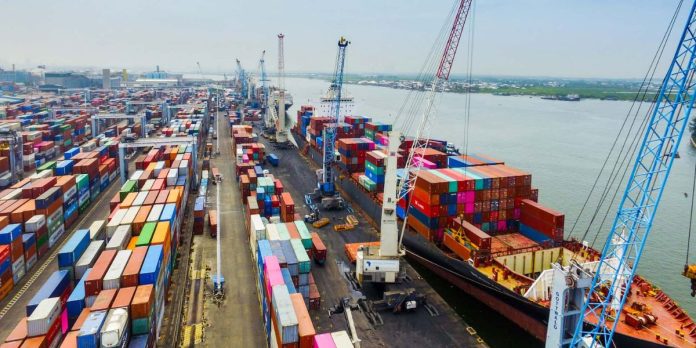The Nigerian Shippers’ Council (NSC) has raised the alarm over the protracted clearance time for containerised cargoes at Nigerian seaports, which currently averages 21 days—far longer than global benchmarks.
The NSC attributed persistent police interference, particularly through the frequent issuance of detention orders by the Nigeria Police Maritime Command, as the primary cause of delays.
Speaking at the maiden edition of a workshop on “Facilitating Port Efficiency: The Strategic Role of Maritime Police,” the executive secretary of the NSC, Dr Pius Akutah, stated that the frequent issuance of detention orders on cargo by officials of the Nigeria Police Maritime Command is disrupting cargo dwell time and exacerbating delays.
Akutah, represented by the council’s director of Regulatory Services, Margaret Ogbonnah, highlighted the sharp contrast between Nigeria’s clearance timelines and those of more efficient ports. According to him, while cargo can be cleared in six hours in Singapore and seven days in Lome, it takes 21 days or more at Nigerian ports.
He lamented that police activities had contributed to rising demurrage and storage charges for consignees, further increasing the cost of doing business at the seaports.
“The Nigerian seaports have consistently been reputed as some of the ports with the longest cargo dwell time in the world. This, in addition to other factors, has affected global perception of Nigeria’s Ease of Doing Business at the ports,” he said.
Akutah noted that despite various government efforts to shorten cargo dwell time, human interference, particularly from law enforcement, remained the main obstacle. As the ports’ economic regulator, he said the NSC is mandated to ensure efficiency and promote port patronage.
He stressed that the Police must stop unapproved interference in cargo processes and adhere strictly to established procedures, especially regarding container detention.
“While it takes only 6 hours to clear containerised cargo in Singapore port, seven days in Lome port, it takes an average of 21 days or more in Nigerian ports. This (in addition to other factors) consequently affected the global perception index on Ease of Doing Business (EoDB) in Nigerian seaports.
“Several efforts by the government to reduce cargo dwell-time at our ports have not yielded the desired results due to several factors, the worst of which is the human factor. However, as the Economic Regulator of the Ports, NSC has the responsibility of ensuring that efficiency is established in the ports to attract patronage,” Dr Akutah stated.
The Shippers’ Council boss further stated that the Police must put a stop to the practices and adhere to processes in matters of container detention and other port-related issues.
“Pursuant to its regulatory mandate, the NSC has been collaborating with several agencies to ensure the facilitation of trade and ease of movement of cargo outside the ports to avoid congestion.
“However, several reports that were brought to the attention of NSC by stakeholders pointed to incessant interference in the cargo clearance processes, placement of detention orders on duly cleared cargoes, thereby barring their exit from the port terminals and intimidation of personnel of Shipping line agencies and terminals. The officers usually claimed they were acting on intelligence reports.
“These interferences often disrupt cargo dwell time, increase demurrage/storage charges payable by consignees and ultimately, lead to an increase in the cost of doing business in Nigerian ports.”
The Shippers’ Council boss revealed that despite an order by the Police Authority to streamline the plethora of letters being issued by various unauthorised persons on behalf of the Police, infractions still exist, thereby necessitating the workshop.
“The Council had on several occasions carried out investigations on the matter, at least, to ascertain the veracity or otherwise of these claims. In most cases, it was confirmed that various police formations carry out these practices without the knowledge of the AIG.
“This development, therefore, led to robust engagement by the Council with the IG of Police to put a stop to these practices and to ensure adherence to process in matters of container detention and other port-related issues.
“As a result, the AIG, Maritime Police Command, notified key stakeholders vide a letter dated 11 December 2018, to communicate to stakeholders the decision to collectively streamline the plethora of letters being issued by various unauthorised person(s) on behalf of the Police.
“He also directed all key stakeholders to disregard any correspondence without the signature of the AIG or officers nominated by him.
“Together, we have achieved quite a lot, although we cannot rest on the past achievements because some of these infractions still occur either deliberately or due to ignorance on the part of the officers involved. Thus, our main focus has to be firmly on attaining international best practices,” he explained.
Speaking earlier, the Assistant Inspector-General of Police, Maritime Police Command, Chinedu Oko, stated that the Maritime Police serve as the security interface between maritime operations, law enforcement, and national security.
Oko, who was represented by the deputy commissioner of Police, Chukwuemeka Obasi, said the Maritime Police are restructuring operations to complement, rather than complicate, port operations.
He said the Marine and Blue Economy emphasises digitalisation, transparency and operational harmony among port actors. To align with these reforms, the Maritime Police are restructuring operations around reducing duplication of enforcement functions by harmonising roles with agencies such as NPA, NIMASA, and Customs, leveraging digital tools for surveillance, cargo monitoring, and intelligence sharing under initiatives like the Deep Blue Project and strengthening partnerships through joint task forces, port security committees, and coordinated responses’ to incidents.”
“These measures ensure that police activities complement, rather than complicate, port operations and despite progress, the Maritime Police continues to face challenges that affect port efficiency because overlapping functions often lead to confusion and conflict in enforcement,” he stated.








